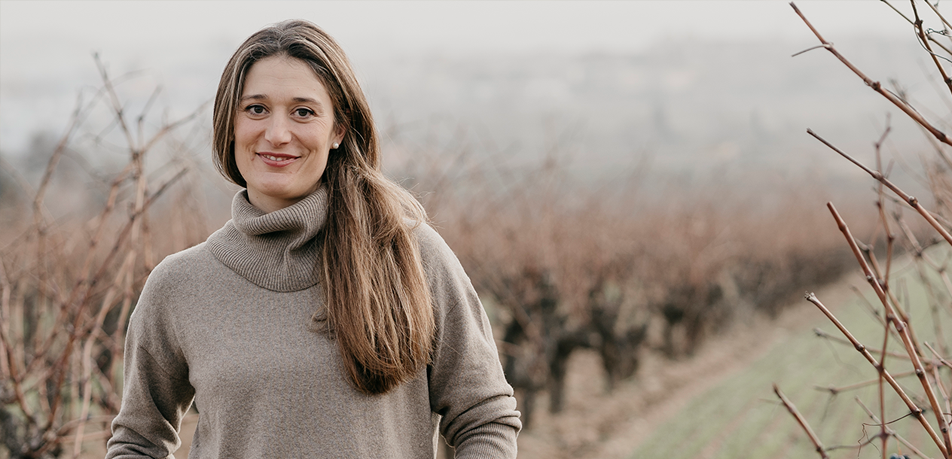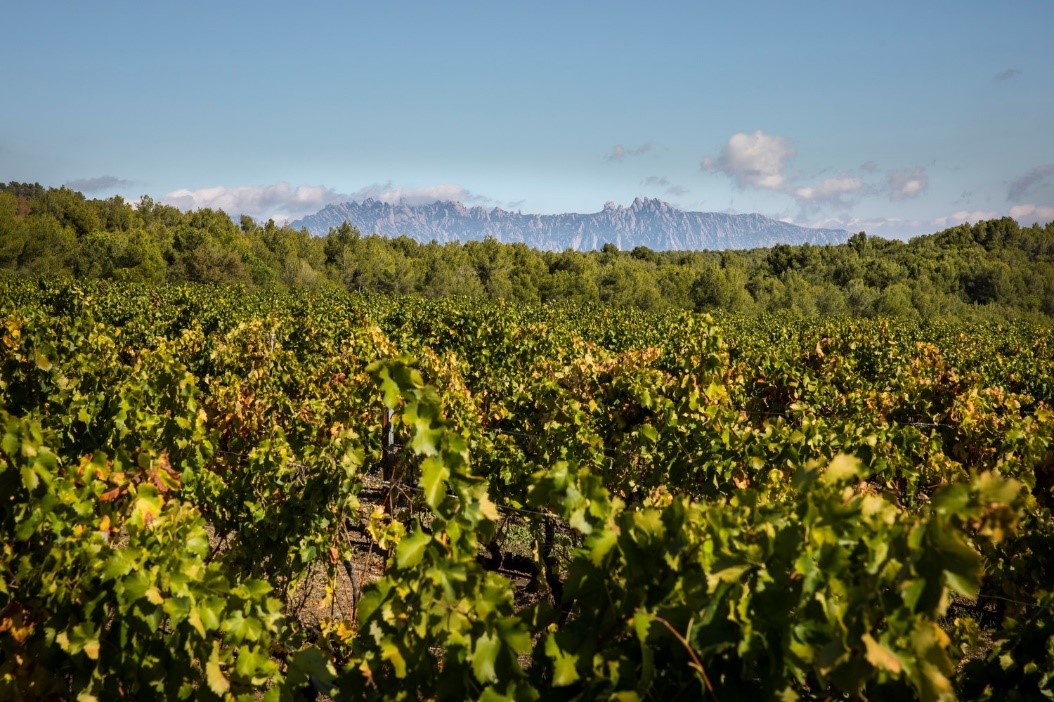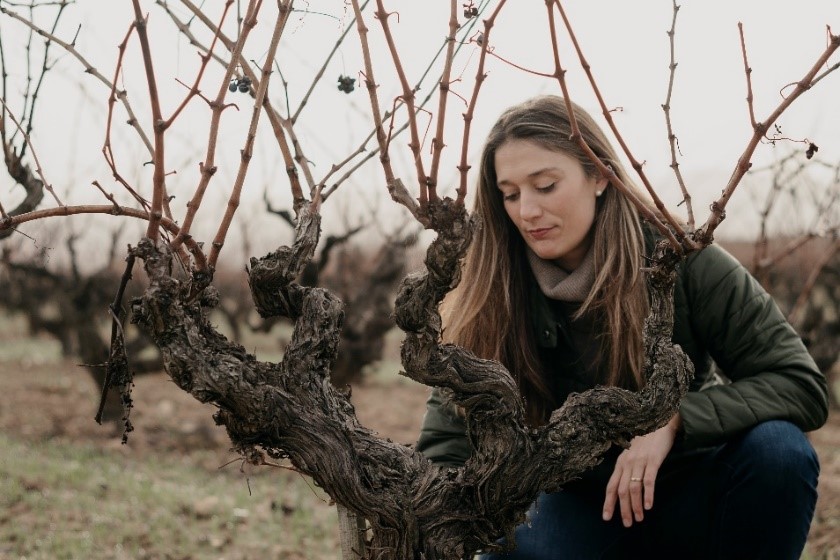Rosa Maria Domènech

Thanks to her experience, knowledge, and love for the job, Rosa Maria has established herself as the guardian, manager, and maintainer of grape and harvest quality: A legacy that is born in the vineyard and perpetuated in life.
Hailing from La Llacuna in the province of Barcelona, Rosa Maria’s life is a compendium of good practices for the vineyard; aromas and images loaded with wisdom and axioms rooted in the land.
(FT): When you think about where it all began, what memories come to mind?
(R): I remember afternoon snack time with the pa vi i sucre (bread soaked in wine and sprinkled with sugar) my great-grandmother – “iaia Cisca” – used to make for me. The wine was the stuff my grandfather would make using the Sumoll grapes from his little vineyard, which was so small that it would only take us a day to harvest it. I have really happy memories of it: young and old working all together in the field. It made us feel “important,” being part of all that.
Another case of calling based on the inevitable. You can’t understand Rosa Maria’s present without her past.
“I’ve always felt a very close bond with the land, the need to be outdoors, and respect for farming. When I had to choose my studies, I went for Agricultural Technical Engineering so that I’d be able to work in the primary sector. I went on to study enology to specialize in winegrowing. I started working at Familia Torres one harvest and I’ve never stopped learning, from colleagues, from the winegrowers, from every harvest”
(FT): Nowadays, your work is linked to a kind of archeology of the terroir, of subdividing the land, of choosing the variety associated with the expression of each area; respecting the cultural practices of each winegrower.
(R): In each area, we look for the varieties that have adapted best, the places where they express their greatest potential. The paradigmatic terroir is different in each region; we look for vineyards with balanced production and slow ripening. The variety, the soil, and the climate make up the identity of each wine, but the cultural practices and winegrower’s work is crucial in order to get quality grapes.
A connoisseur of the territory, Rosa Maria’s daily life runs along paths of grapevines and humanity; unique vineyards and weathered faces.
“Getting the best grapes means delving deeper into very different territories, from Terra Alta, Priorat, Montsant, Costers del Segre, Penedès, all the way to Empordà. Very different landscapes, unique vineyards, but also unique personalities.”

[[{"fid":"21445","view_mode":"default","fields":{"format":"default","alignment":"","field_file_image_alt_text[und][0][value]":false,"field_file_image_title_text[und][0][value]":false},"type":"media","field_deltas":{"1":{"format":"default","alignment":"","field_file_image_alt_text[und][0][value]":false,"field_file_image_title_text[und][0][value]":false}},"link_text":null,"attributes":{"height":702,"width":1054,"style":"height: 333px; width: 500px;","class":"media-element file-default","data-delta":"1"}}]]Garnacha vineyard (with the Monserrat mountains in the background) that is the source of the grapes for the Vinyarets wine (DO Penedès)
(FT): What do you take into account when you look for the best grape for the new projects, and for Vinyarets, specifically?
(R): The new projects, such as Vinyarets, for example, allow us to give a voice to the vineyards from which we’ve already been obtaining high-quality grapes for a while, to vinify separately, and for them to be able to express themselves. We’ve chosen well-oriented, balanced organic vineyards, in different soils and at different altitudes, to represent the great diversity that makes up the Penedès, giving value to varieties such as Sumoll that come from all over the territory since there aren’t that many vines. It provides tannin and an herbaceous note. The Alt Penedès vineyards (Alts d'Ancosa:Ancosa Highlands and Costers de l'Anoia: Anoia Hillsides) have been chosen for the Garnacha, here we’re seeking more altitude and coolness, where the ripening is slower and more measured; it gives us the fruit, the vigor. The Tempranillo comes from Penedès Medio (Turons de Vilafranca: Hills of Vilafranca), and here we’re looking more for concentration.
(FT): You are the maintainer, in many cases, of centuries-old relationships and collaborations. Do you still find the essence of good vineyard management in people?
(R):
I love chatting with the winegrowers, listening to anecdotes about their ancestors or past harvests. It makes an impression on me when they tell me that they are continuing the work of their grandparents; it’s like perpetuating history.
A whole year of effort culminates in the harvest: D-day and H-hour for our dear Rosa Maria.
[[{"fid":"21446","view_mode":"default","fields":{"format":"default","alignment":"","field_file_image_alt_text[und][0][value]":false,"field_file_image_title_text[und][0][value]":false},"type":"media","field_deltas":{"2":{"format":"default","alignment":"","field_file_image_alt_text[und][0][value]":false,"field_file_image_title_text[und][0][value]":false}},"link_text":null,"attributes":{"height":560,"width":840,"style":"height: 333px; width: 500px;","class":"media-element file-default","data-delta":"2"}}]]

Rosa Mª among old vines that will be pruned soon.
“I spend the day looking at the sky (and at weather apps), tasting the grapes in the vineyards, doing a lot of talking and listening to coordinate the needs of the winegrowers, winemakers, and winery.”
(FT): What are harvests like for you?
(R): It’s a really tense time. The efforts from the entire year are literally “hanging” on the vines and everyone is in a rush to harvest. Our job is to optimize logistics so all of the grapes can be harvested at the right time and express their maximum potential.
Rosa Maria likes wines with identity, with an origin, linked to the land and the people who make it possible. Paradise is never far, and so the best plan gives in to the simplicity that encompasses the essence of all things:
